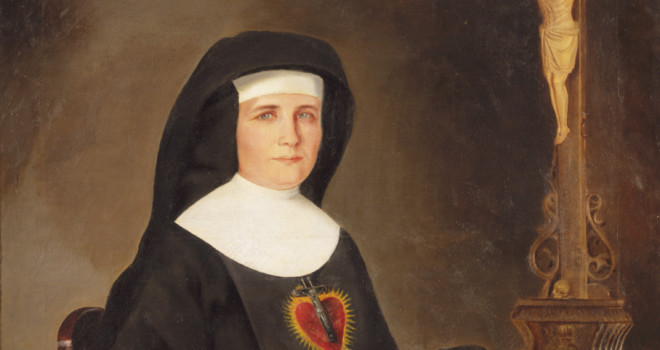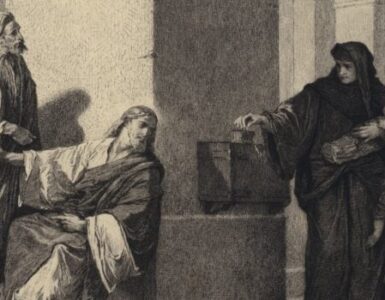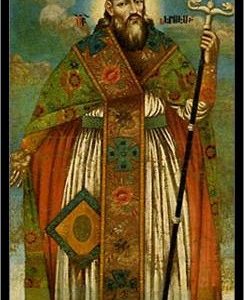An indiscreet servant had betrayed them to the Russian police. Soldiers were dispatched to make a search of the house, but they did not discover the religious rule or the identity of the founder. However serious suspicions had been raised and the young superior was now being watched. It was a dangerous time indeed, 1892, in which to be a persecuted religious living in a partitioned Poland.
The young superior, Sister Louise, belonged to the clandestine religious community, the Servants of Jesus, one of the several Congregations founded by the intrepid Franciscan, Blessed Honorat Kozminski and organized by him covertly from the sanctuary of his confessional. His Sisters dressed as laity but were actually professed religious, all of them knowing the risk they were taking for the sake of the Lord and the souls in their charge. Louise knew the worst could happen, and now, under surveillance by the Tsar’s forces, it had become far too dangerous for her to remain in Lublin.
Within three days, she began her transport from one city to the next, taking the necessary precaution to sleep in a different place nearly every night. Like her Divine Master who had fled Bethlehem from the wicked Herod, Louise also would endure the hardships of flight, but by this means, in the designs of Providence, she would be brought to Krakow, where destiny awaited her.
A Life in Service
Louise Szczęsna [s-CHENS-na] was born on July 18, 1863, in Cieszki [CHESH-key], Poland to a devout and hardworking Catholic family. Her schooling was compromised due to the political upheaval of the time, however she did manage to acquire an education by itinerant teachers.
At the age of seventeen, under pressure from her father to marry, she left her family home to live in the distant city of Mława [m-WAH-vah], where she would eventually meet Blessed Honorat and fulfill her lifelong dream of entering the service of God.
Sister Louise was a model religious, devout and hardworking as she labored in service for the spiritual and moral needs of domestic servants and ran a seamstress shop. She was described in glowing terms by one of her companions, Sr. Aloysius Rostkowska:
“She was unusually obedient. Louise had much simplicity and cheerfulness. She was quiet and full of love for everyone. These external virtues and qualities made her a very kind and likable Sister and a very good influence on the servants.”
Help From a Saint
Aware of the danger she was in from the Russian secret police, her superiors looked for an opportunity to send Louise to safety.
As God so ordered things, at this same time, a professor at the Jagellonian University, Father Joseph Sebastian Pelczar, wrote a letter to the Superior of the Servants of Jesus requesting Sisters to help him with an undertaking in Krakow.
Father Pelczar had recognized the real moral dangers facing girls coming from the rural districts to Krakow to work as domestic help in the homes of the wealthy. He had set up kitchens and dormitories for them under the auspices of his lay Confraternity of Our Lady Queen of the Polish Crown, but he later realized that religious Sisters would be better suited to the demands of this apostolate.
Sister Louise was sent to Krakow. With generosity and zeal, Sister Louise undertook the mission to work with servant girls, despite the pain she experienced in her separation from all that had been familiar to her.
The political climate in Krakow gave more freedom to the Church, allowing for the wearing of religious garb and open apostolic work. Therefore, perceptive to even greater needs of the region, Father Pelczar sought and received permission of Cardinal Dunajewski of Krakow to draw up a rule of life whereby a habited Congregation could continue to work with girls, while also caring for the sick in their homes. The Servants of Jesus did not feel called to adopt such a change in charism, so on April 15, 1894, a new religious Congregation was called into being, the Sister Servants of the Most Sacred Heart of Jesus. Within this new religious family in the Church, Sister Louise became the first Sacred Heart Sister, first superior and formation director, taking the name Klara. There were twelve Sisters at the Congregation’s inception.
St. Joseph Sebastian wrote of this significant time:
“Mother Klara Szczęsna worked with me in the founding of the Congregation. She was characterized by great prudence and love in directing the Sisters, and with courage and patience in bearing constant illnesses and anguish. During her governance, the Congregation demonstrated remarkable growth.”
The Congregation grew rapidly and Mother was responsible for forming new Sisters, opening houses, directing apostolic outreach, and guiding this new way of life in a truly motherly but firm spirit for the Sisters, herself a living rule of love, devotion and observance. What is significant also is that Mother accomplished all this in very poor health.
Sanctity and the Blessed Sacrament
In those early days of the Congregation, Mother held out to the Sisters a sure way to sanctity, but one that would require nothing short of the self-offering of everything. She said this of this call to sacrificial love:
“The Holy Spirit says that love is stronger than death. What kind of love is it that will not bear anything that discourages us or that grows disgusted with little things? O how rare is a holy, perfect, and mutual love?”
Mother would say, “We must give glory to the Most Sacred Heart of Jesus with our whole lives. We must be obedient to the Divine Heart and offer this Heart our love, and this, not only interiorly, but in action as well, that the love of the Savior may be known and returned by many. We must do this by good example, words and prayer. Everyone should see in us the Servants of the Divine Heart, Servants of the Merciful Heart, good and open to the needs of man.”
As one Sister attested, Mother Klara herself lived this ideal. “As I observed Mother Klara closely throughout those fourteen years, it seemed to me that she personified all the Christian virtues. Such a spirit of Christ radiated through her whole person.”
She had a great love for the Blessed Mother whom she took as her model of life. She was also ardently devoted to the Heart of Jesus in the Most Blessed Sacrament, where she found light and strength, the source of transformation. Mother Klara left these profound words among her few written meditations:
“How numerous the transgressions against love and sweetness! Receiving the Body of the Lamb of God you should live his life, imbued throughout with his sweetness! He is so sweet upon the altar and in your heart. After receiving and adoring Him, remember to remain as long as possible in silence under that ineffable sweetness with which he is present within you. Ask him to calm all the unrest in your soul and to give you the peace beyond all understanding. Possessing this peace you are capable of being good, gentle and patient.
Consider Jesus’ sweetness. Behold his sweetness in the Sacred Host. Such sweetness will make you master over your own heart, giving you self-control and granting true victory. It will make you master over the hearts of others since this sweetness unites hearts, relieving and disarming them, converting souls and winning them for God.
Finally, you will possess God’s own Heart, since nothing makes you so resemble him as does this sweetness. God, moreover, seeing in you his likeness, will not refuse you his love. The peace of a soul in possession of itself is a participation in the glorious, unchangeable and serene calmness of God. God is the God of peace. His Spirit is sweet. In a singular way, he rewards sweetness –that virtue of Jesus—and hearkens to its prayers.”
Mother Klara died in the odor of sanctity in Krakow on February 7, 1916, at the age of 53. She had seemed to rally at the end, but the Beloved came suddenly to take this beautiful soul to himself. The Sisters’ Chronicle gave this record of Mother’s last moments:
“About twelve o’clock, the bell rang, the Sisters ended examination of conscience and went to dinner in the refectory. At that time, her heart attack occurred. Mother Klara Louise Szczęsna has died a holy death. She suffered very much, but to her last breath, she demonstrated a truly holy patience. Continually, with the acts of prayer, she united her sufferings with the sufferings of our Lord Jesus. A true Mother, loving her Congregation very much.”
Her motto, All for the Heart of Jesus, the program of life that animated her at the infancy of the Congregation, continues within its members to this very day. Mother Klara’s complete self-offering, united to that of Christ himself, transformed her into a living reflection of the Heart of Jesus Christ and became her glorious destiny. May it be so for us!
Mother Klara Ludwika (Louise) Szczęsna was proclaimed Blessed on September 27, 2015 in Kraków. Her mortal remains are entombed in the Sisters’ Motherhouse Church of the Most Sacred Heart of Jesus in Krakow, Poland. Her Memorial is observed on February 7.
Prayer for the Intercession of Blessed Klara Szczęsna
Almighty God, source of life and holiness, I thank you for the graces bestowed on Blessed Klara Szczęsna who trusted you completely and dedicated her life for the glory of the Most Sacred Heart of your Son. In Christ, hidden in the Most Blessed Sacrament, she found the strength and light to discern the intentions of his Heart and to be of sacrificial service to her neighbor, giving an example of faithful love and humility. Teach me to imitate her in her love for the Most Sacred Heart of Jesus and her zeal for spreading the Kingdom of His love, and through her intercession hear my prayer and grant me the grace of …… which I ask of you through Christ our Lord. Amen.
Blessed Klara Szczęsna, pray for us!
✠
For more information about Blessed Klara, please see the Sisters’ website at www.sacredheartsisters.org. For graces and favors received through Blessed Klara’s intercession, please contact: Sister Servants of the most Sacred heart of Jesus 866 Cambria St., Cresson, PA 16630 Ph. (814) 886-4223 e-mail: sscjusaprovince@gmail.com
image: S. Klara Ludwika Szczęsna, circa 1916 / Wikimedia Commons (Public Domain)












